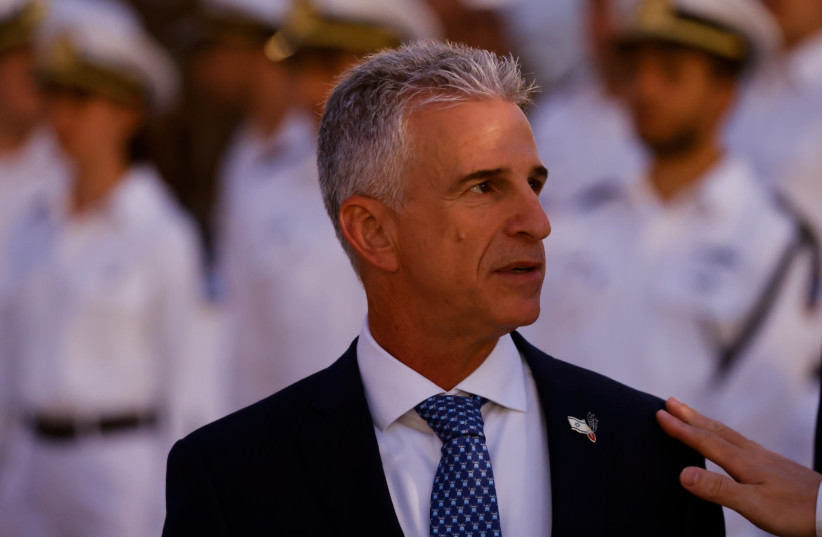Mossad Chief David Barnea is expected to head to Doha early this week for hostage talks as Hamas has put a new proposal on the table, which appeared to revive the stalled negotiations.
Barnea will meet with Qatari Prime Minister Mohammed al-Thani and Egyptian officials in an attempt to bridge the gaps between the positions of Israel and Hamas, a source told Reuters.
The Security Cabinet is expected to meet on Sunday to determine Israel’s redlines and the Mossad head is expected to leave only after that meeting.
The Prime Minister’s Office dismissed reports that the meeting had been delayed, noting that the Security Cabinet had been expected to meet Sunday once the war cabinet determined on Friday that a delegation would head to Doha.
Defense Minister Yoav Gallant held a meeting Saturday night on the hostages with senior officials from the IDF, Mossad, and the ISA, as well as representatives of the Israeli negotiating team.

This came as Tel Aviv police used water cannons to disperse demonstrators blocking the Ayalon Highway. The protesters are calling for a deal to release the hostages and demanding early elections.
Qatar and Egypt, with the active support of the US, have been mediating a deal to secure the release of the remaining 134 hostages held in Gaza.
The US had hoped to see a deal by the start of Ramadan last week, but Doha and Cairo were not able to find enough wiggle room between Hamas’s demand that a deal must include an end to the war and Israel’s insistence that it must be allowed to finish its military operation to destroy the terror group.
Hamas's ceasefire proposal
At issue has been the possibility of a three-phase deal in which the issue of a permanent ceasefire would be dealt with at a later stage.
A Hamas senior official stated on Saturday that the terror organization would not release a single hostage without an agreement on the second phase of a deal with Israel, KAN reported.
The phase would have to include “the cessation of hostilities,” the official said.
Hamas this past week presented a Gaza ceasefire proposal to mediators and the US that includes the initial release of women, children, elderly, and ill hostages in return for the release of 700-1,000 Palestinian security prisoners and terrorists held in Israeli jails.
This proposal also includes women hostages serving in the Israeli army. It had previously been thought they would be released only in a later stage of the process.
The deal would also include a pause to the war, which in the past the US has said would last for about six weeks.
Hamas said ceasefire negotiations had faltered over the past few weeks due to Prime Minister Benjamin Netanyahu’s rejection of its demands – which include a permanent ceasefire, an IDF withdrawal from the enclave, the return of the displaced Palestinians in the south of the Strip to the center and the north, and stepping up aid without restrictions.
In February, Hamas received a draft proposal from Gaza truce talks in Paris that included a 40-day pause in all military operations and the exchange of Palestinian prisoners for Israeli hostages at a ratio of 10 to one – a similar ratio to the new ceasefire proposal.
According to the latest proposal, Hamas said a date for a permanent ceasefire would be agreed upon after the initial exchange of hostages and prisoners, as well as a deadline for an Israeli withdrawal from Gaza.
The group said all detainees from both sides would be released in the second stage of the plan.
The war was triggered by a Hamas-led attack on southern Israeli towns on October 7 in which some 1,200 people were killed and 253 taken hostage.
Since then, more than 31,000 Palestinians have been killed in Israel’s military operations in Gaza, Hamas has asserted. Israel has said that over 13,000 of them have been combatants.
During a visit to Vienna on Friday US Secretary of State Antony Blinken confirmed that Hamas has sent a counter-proposal.
“We’re working intensively with Israel, with Qatar, and with Egypt to bridge the remaining gaps and to try to reach an agreement. We have conversations that are happening now as we speak here, and I am convinced they’ll go on into the coming days,” he said.
Israel’s decision to send a negotiating team back to Doha, he said, reflects the sense both of possibility and of the urgency to get an agreement, to get a ceasefire, to get the hostages back, and to get even more humanitarian assistance in. This is something that we’re committed to, and we will work as long and as hard as it takes to get it done.”
Jerusalem Post Staff contributed to this report.
